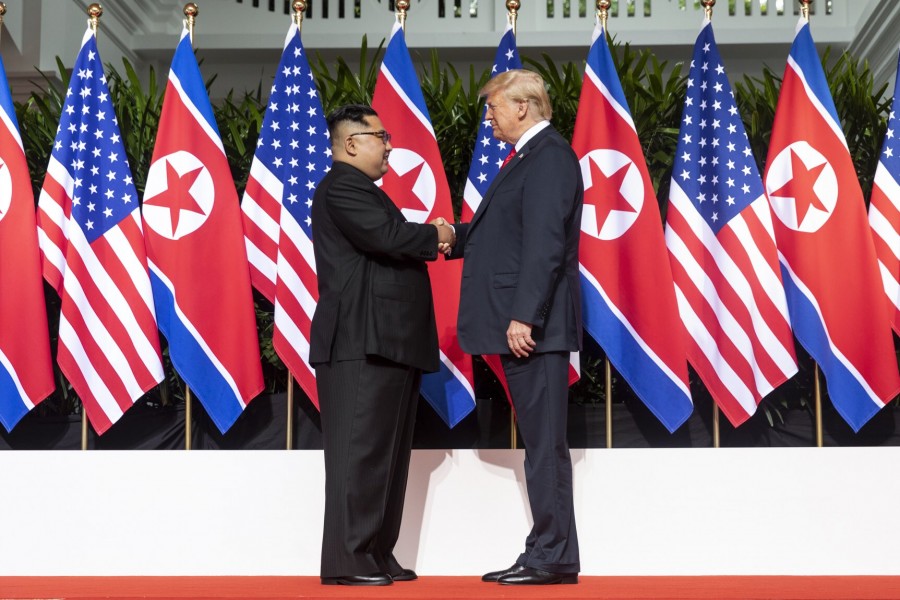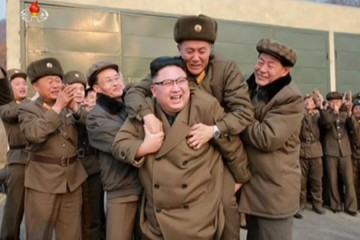This week's historic meeting between President Donald Trump and North Korean leader Kim Jong Un in Singapore produced significant fanfare, but the diplomatic outcome was much less certain.
Though the two leaders signed an agreement after their hours-long meeting and Trump said Kim had promised to denuclearize, questions remained about the specifics of the deal and what—if anything—had actually been accomplished.
For insight, the Hub turned to Jeff Pryce, a professorial lecturer and fellow of the Foreign Policy Institute at the Johns Hopkins School of Advanced International Studies in Washington, D.C.
Pryce, an attorney who focuses on international law and dispute resolution, spent six years working on international security at the Department of Defense, including nuclear disarmament negotiations with Russia, Ukraine, Kazakhstan, and Belarus. He was also worked on policy and response to crises involving Bosnia, Russia, Iraq, Haiti, and North Korea.
What's your overall assessment of the Singapore summit, based on what you know about the reported agreement?
Overall, I think it was a win for Kim. It's not as clear how it advances our interests, but at a minimum it's putting the focus back on diplomacy and less on military confrontation, and I think everybody is happy about that.
Kim has had three basic objectives. He wants security—some assurance of the survival of his regime and himself—and that's a large part of what's motivated his nuclear arms program. The second thing he's looking for is international recognition, respect, and acceptance. And the third thing is economic development. By having the summit, he has gained quite a bit in the way of international recognition—sitting down one-on-one with the President of the United States, the most powerful country in the world, when North Korea is far from that.
So I think he has gained something that has always been an objective; the question is, did the United States get anything concrete on the other side? And looking at the [Trump-Kim] joint statement, there doesn't look to be too much that is concrete there.
Going into the summit that night, I was asked what would be a good outcome for the United States, and I said success would be a timetable with concrete steps towards the denuclearization of North Korea, CVID (Comprehensive, Verifiable, Irreversible Denuclearization). That would be highly optimistic. More likely and still positive would be a road map of steps toward the negotiation of such a result, the negotiation in that direction, and we didn't get that. The joint statement was really quite thin.
Having been in similar negotiations with other countries, there's a kind of a document that you draft when you want to have a signing ceremony, but there isn't anything very concrete in the way of an agreement to sign. This seems more like one of those. It's a joint statement, which basically reiterates in very general terms commitments that have already been made. It says that parties had an historic meeting, and that they're committed to seek improved relations and world peace, but it's not legally binding nor particularly concrete as far as specific steps that are required, particularly of North Korea.
So when the president says—or tweets, as he did this morning—that North Korea is "no longer a nuclear threat," we don't have any real reason to believe that's true.
They're not in a significantly different position today than they were going into the summit. They've demonstrated a nuclear capability, they've demonstrated a long-range missile capability, and what seems to have come out of this process is sort of a pause or a freeze where North Korea has ceased testing its missiles and nuclear warheads. But they've already demonstrated that they have them. So the hard part is going to be to dismantle and remove those capabilities in some verifiable and irreversible way.
Right now we seem to be in a status quo phase, which has not reduced North Korea's capability. They're not moving forward, but it may be that Kim thinks he's done enough for now to assure his security.
On the other hand, and this is not in the joint statement, but President Trump talked about canceling military exercises with South Korea. The problem with that is that North Korea's nuclear capability is demonstrated, and you don't need to continue to test nuclear weapons once you've reached a certain stage.
But conventional deterrence and conventional readiness is something that you do need to continue to exercise to maintain. We are in a very strong position conventionally, militarily, and so is South Korea, but I don't necessarily see a complete symmetry between North Korea ceasing its development of further nuclear and missile technology and us halting our ongoing readiness exercises with our South Korean allies.
Canceling one exercise is not the end of the world, and we have done it before. That's sometimes been seen as useful in a diplomatic context. But I think we have to be careful that we continue to reassure our allies in the region that we are continuing our presence and deterrence posture there.
I want to go back to the issue of verifiability. If we take President Trump at his word, there is some informal agreement about denuclearization—not just a pause, but actual denuclearization. In the coming months or years, what sorts of things would we look for as proof that this is actually taking place?
I think we would have to have very intrusive inspections, and we would have to have very concrete procedures in place. We have done this before. The [International Atomic Energy Agency] has a mission to verify that nuclear materials are not being used or diverted for military purposes. The capability is there, institutionally and technically.
The problem is going to be ensuring that we have access to all the potential sites that are of concern. The North Koreans have engaged in theatrical destruction of certain facilities, but at the same time, in the past they have shown that they're able to cheat on their commitments by conducting activities in sites that aren't declared, that aren't known to the international community.
Having access to all the potential sites of concern is critical, and that would require something new for North Korea. They have allowed IAEA access before but the level of access, the level of verification that you need to be confident, I think, would be quite extensive and quite intrusive.
Setting aside that Kim has accomplished some of his objectives going into this summit, overall does it feel like a positive step for the parties involved, and for the world, compared to where things were going in?
Well the worst case would be a war in Korea, and that would be horrific. Everyone would lose. North Korea would certainly lose, but there would be no winners. So to the extent that we have moved away from that possibility or threat, and moved toward a diplomatic engagement, that's to the good.
But as regards negotiation, I think you have to say that Kim has achieved quite a bit of what he hoped to achieve upfront, and there's still a lot that we would like to have achieved that remains yet to be accomplished in the course of negotiation.
Kim has gone from being a pariah to emerging significantly from his prior isolation and engaging as a world leader on the diplomatic stage—with us, with the Chinese, with the South Koreans, and he's expected to have a meeting with the Russians. In an ideal world, that kind of relief from isolation would have come after he had started to move concretely towards denuclearization. The sort of increased status and legitimacy that he's attained throughout the last few months may also make it harder to maintain sanctions on him, particularly to the extent that China may now be less willing to support the same level of sanctions that they had in the past.
Now, if the end result is more peace and stability in the Korean Peninsula, including denuclearization and forward movement inside North Korea, on economics but also particularly on human rights and the situation of his people, then that would in the long run be a good thing. But a lot of those objectives are yet to be accomplished. And Kim cannot be allowed to claim a spot on the world stage without addressing the horrific human rights situation within his country.
So I think if you're taking a hard assessment of it right now, you have to say that as of today, Kim has made some real progress towards his objectives; meanwhile, a lot of the objectives of the West remain to be accomplished. Hopefully they can be advanced in the months and years to come.
Posted in Voices+Opinion, Politics+Society
Tagged north korea, donald trump, nuclear weapons










